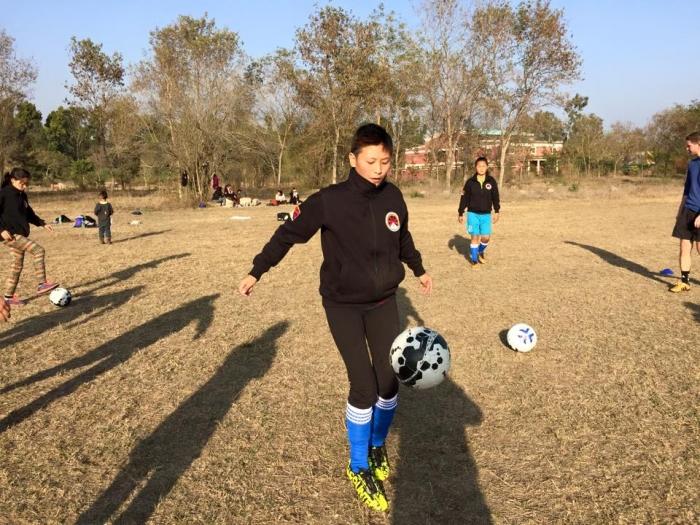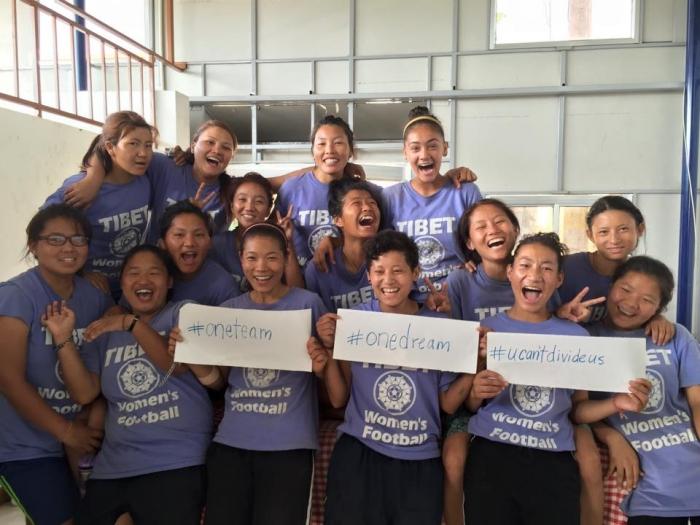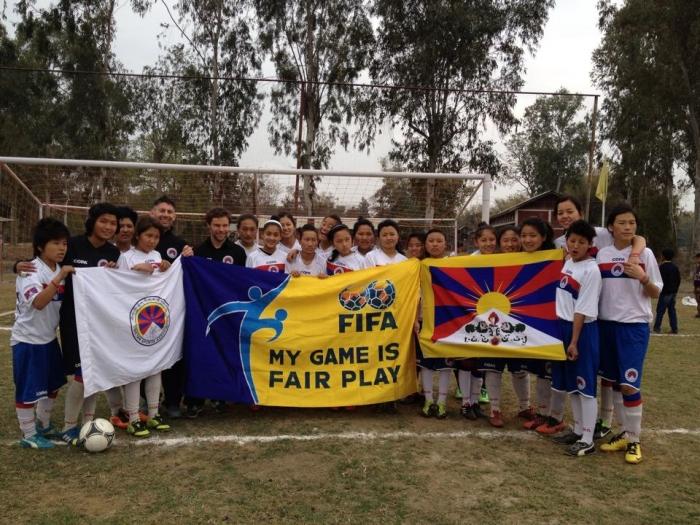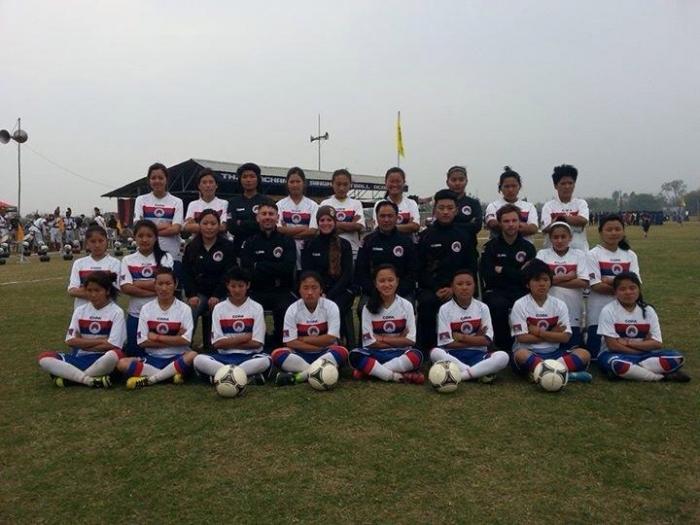
"The thing about football - the important thing about football - is that it is not just about football."
- Terry Pratchett, Unseen Academicals
Pratchett's quote perfectly sums up the five-year journey of the Tibetan women's football team in India. Once living ordinary lives in the foothills of the Himalayas, these women have now not only become ambassadors for gender equality in the conservative Tibetan society, but are also at the forefront of the community's fight against the Chinese occupation of their homeland.
It all began with an American national, New-Jersey based teacher Cassie Childers, visiting Dharamsala in 2005.
For over half a century, Dharamsala, the lower Himalayan city in Himachal Pradesh, has housed thousands of refugees from Tibet. Childers first came in contact with members of the Tibetan community on her visit in 2005. She was fascinated by the culture and the religion of the group and thereafter kept returning to Dharamsala to study Buddhism.
The Tibet Women's Soccer initiative
"During these visits, I learned more about some of the most pressing social problems of the community," she says. In male-dominated Tibetan society, she learnt that most women had a tough time living on equal terms with men. Issues like domestic abuse were still prevalent in many households.
A former footballer herself, Childers found to her dismay that there was no organised sports programme in the community for its women. There was no Tibetan women's national team in any sport. Back in Dharamsala in 2010, Childers attended an exhibition on the history of Tibetan football. She noticed that she was the only woman in the room.
"In what seemed like an instant, I got the idea of using soccer as a tool for women's empowerment and as a means for sports diplomacy to help with the Tibetan freedom struggle," Childers says.
She soon pitched the idea to the Tibetan National Sports Association, who immediately accepted her proposal. In a few weeks' time, Childers had given up her teaching job in the US, moved permanently to India and, under the aegis of Tibetan National Sports Association (TNSA), founded the Tibet Women's Soccer (TWS) initiative.
The early days
"In the beginning, it was easy," says Childers. The Tibet Women's Soccer programme received widespread support from within the community, and was experiencing commendable results on and off the field. Soon, journalists from around the world were enquiring about it. For the players, the initiative proved to be a game-changer.

"I never had the chance to play football while growing up in Tibet. Neither did I have much knowledge of the sport at the time. I was, however, fortunate enough to be able to come over to India and attend school instead of living under occupation back home. It was during my schooldays here that I first started taking an interest in the sport," says Tibetan women's team player Sonam Palyang.
Palyang says it was Childers's initiative that first gave her the opportunity to take up the sport professionally.
"I have been able to go abroad, compete against players of different nationalities. None of these would have possible without this programme," she says.
At loggerheads with the Tibetan National Sports Association
The Tibetan men's national football team was formed in 1999. Playing against teams like Greenland and Monaco in its early days, the forbidden team, as it was famously called, managed to draw considerable attention to the Tibetan cause.
Things changed with the global economic recession in 2008. Sports authorities found it hard to mobilise finances, as sponsors began stepping away. Moreover, with incessant Chinese pressure on European countries, it became difficult for the Tibetan team to play against teams in Europe.
This has resulted in the Tibetan men's national team being inactive for over seven years. In contrast, the women's soccer initiative, despite very little international exposure, has managed to enjoy considerable success in its endeavour so far. This, Childers says, has not gone down well with the sports authorities. She alleges a lack of support from the Tibetan National Sports Association (TNSA) for her initiative. Recently, growing disenchantment over TNSA's attitude towards the initiative forced Tibet Women's Soccer to sever ties with the body, and continue its operations as an independent NGO.

"The Tibetan National Sports Association (TNSA) tried to limit the formation and growth of school girls' teams, divert material and financial resources to the men's side, and even went to the extent of saying that sports are not important for girls. The players were eventually forced to rebel against the sports association and determine the course of their own future as athletes," Childers explains.
The TNSA, however, denies being apathetic towards the women's game. Kelsang Dhondup, chairman of the TNSA Executive Committee, says: "If we weren't interested in the girls' team, we would not have invited Childers to be the TNSA coordinator for the women's football programme in the first place. We have organised winter camps for girls in the last three years, as well as a few exhibition matches. We also started a grassroots program for girls in nine Tibetan schools, later expanding it to two more schools."
Whatever may be the issues between the two bodies, Cassie Childers' contribution to the women's game and to the Tibetan community remains undeniable. Had it not been for her initiative, it is difficult to see a successful women's football programme materialising by this point of time.
The FIFA conundrum
One of the initial aims of the initiative was to help the Tibetan freedom struggle. Tibet Women's Soccer's growth has so far been quite commendable, and as it aims to go international in the future, it could play an important role in drawing the world's attention to the Tibetan cause.
"We definitely plan to compete against other national teams. We are not quite ready yet, but once our team is built up to that level, we will compete as much as possible," says Childers.

While competing on an international platform will be a major boost to Tibet's footballing aspirations, gaining FIFA recognition, however, will be a difficult task. In 2004, the international football governing body had unequivocally rejected Tibet's demand for official recognition. Given China's political clout on the global stage, it is unlikely that the Chinese-occupied Tibetan region will be given FIFA membership anytime soon. Childers, however, is hopeful that things will change in the future.
"Currently, FIFA recognises 23 non-sovereign entities for participation in its tournaments. Why not Tibet? It will be a fight against China's financial and political might, but I feel certain that we will achieve this goal in due time. Right now we are just concentrating on building our programme up to allow our team to be able to compete at the highest level, and then we will start the legal appeal for recognition," she says.
TNSA chief Kelsang Dhondup doesn't sound as optimistic. "Very few countries will support us in our cause, simply because of the fact that the country occupying us is China. Even a superpower like USA wouldn't support Tibet on an international platform," he says. He laments the attitude of FIFA, UN and other international organisations over the Tibet issue, saying there is little hope for Tibet unless China changes its stance.
The recent years and the road ahead
"The majority of the players don't have parents in India. Most are still living in Tibet, having sent their child to live in freedom in India. Some of the players don't have regular contact with their families back in Tibet, so they don't even know that their daughters are playing football!" Childers says.
For most of the players, football has been more than a welcome addition to their exiled lives in India. "Football has helped me immensely, both mentally and physically. Today I am living a happy life, a healthy life. More importantly, society no longer sees any difference between us and the boys. Football has been a great leveller for all of us," Sonam Palyang says.
"In terms of changing society's perception of women, and its attitude to sports in general, there is no denying that Tibet Women's Soccer has played a major role in recent years," Palyang's teammate Yangdan Lhamo weighs in.

When it comes to the action on the field, the Tibetan women's team has managed to hold its ground against various provincial outfits in India over the years. In 2014, it lifted the title at the Imphal Ladies' Spring Football festival in Manipur. More recently, a seven-member delegation visited Germany to take part in the Discover Football International Football Festival, its first ever international tour.
During the event, the Tibetan players had the opportunity to meet players from China, the first time in history that athletes from the two states have met each other in an international competition. "It was extremely emotional and productive, and will hopefully kick-start a long tradition of sports diplomacy between the two countries for years to come," says Childers of the meeting.

The Tibetan players' participation in the Berlin event has once again brought the world's attention to the Tibet Women's Soccer initiative. The next aim of the project, Childers says, is to make the sport accessible to every Tibetan girl living in exile in India. At the same time, the senior team will engage in a more competitive football environment.
"Eventually, we will take the team all the way to the World Cup and the Olympics," she asserts.








![BJP's Kapil Mishra recreates Shankar Mahadevan’s ‘Breathless’ song to highlight Delhi pollution [WATCH] BJP's Kapil Mishra recreates Shankar Mahadevan’s ‘Breathless’ song to highlight Delhi pollution [WATCH]](https://images.catchnews.com/upload/2022/11/03/kapil-mishra_240884_300x172.png)

![Anupam Kher shares pictures of his toned body on 67th birthday [MUST SEE] Anupam Kher shares pictures of his toned body on 67th birthday [MUST SEE]](https://images.catchnews.com/upload/2022/03/07/Anupam_kher_231145_300x172.jpg)






